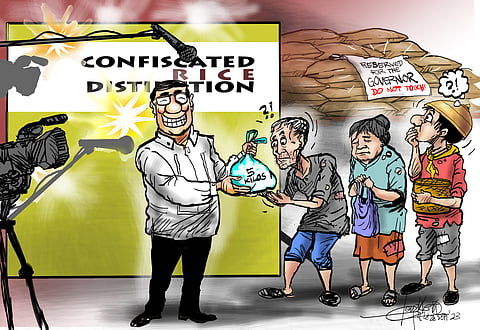
- NEWS
- the EDIT
- COMMENTARY
- BUSINESS
- LIFE
- SHOW
- ACTION
- GLOBAL GOALS
- SNAPS
- DYARYO TIRADA
- MORE

The distribution of confiscated rice to approximately 5,000 underprivileged beneficiaries in the Zamboanga Peninsula on Tuesday, led by President Ferdinand R. Marcos Jr. and Department of Social Welfare and Development Secretary Rex Gatchalian, marked a significant step forward.
The 5,000 bags of Jasmine rice, which accounts for approximately 11.8 percent of the total 42,180 bags of imported rice valued at P42 million confiscated by the Bureau of Customs-Port of Zamboanga in a raid on a warehouse in Barangay San Jose Gusu, Zamboanga City on 19 May, effectively addressed the immediate food requirements of some of the most impoverished beneficiaries residing in the municipalities of Tungawan, Sibuco and Zamboanga City.
More indigents in the province struggling with food insecurity and lacking access to nutritious meals await the distribution of the remaining 37,180 bags. They, too, want to be assured of sustenance during times of hardship.
A matter of concern, however, is the possibility that unscrupulous government officials may repurpose confiscated smuggled rice for their personal gain, instead of utilizing it for the intended public welfare.
Over the weeks since August, a total of P940 million worth of smuggled rice was seized by authorities. In three warehouses in Bulacan, P500 million worth of smuggled rice was found. This was not confiscated though. The warehouses were just padlocked, and we are in the dark if charges were filed against the owners.
An estimated P40 million worth of smuggled rice from Vietnam, Thailand, and China was seized in Bacoor, Cavite, and Pulang Lupa, Las Piñas, on 14 September.
On 18 September, government agents raided warehouses in Tondo, Manila, where P400 million worth of suspected smuggled rice and other imported products were found.
Confiscating smuggled goods, such as rice, should allow the government to tackle the illicit trade while ensuring fairness in the distribution of the seized items.
We ought to exempt our country from the roster of developing nations because it is where the poor bear a disproportionate burden due to smuggling activities, making it imperative to prioritize their welfare over the interests of greedy traders in cahoots with corrupt officials.
By ensuring a fair distribution of nearly a billion pesos worth of confiscated smuggled rice, the national government reduces the demand for illegal markets, discourages ongoing smuggling activities, and encourages legal channels for food distribution.
Rather than going uneaten inside sealed warehouses or having them destroyed, distributing them prevents waste and maximizes their value for the benefit of those in need.
While distributing them can address immediate food needs, it should only be part of a broader strategy to address poverty, promote sustainable livelihoods, and improve access to education, healthcare, and economic opportunities for disadvantaged populations.
In bridging the gap between the haves and have-nots, ensuring that even the most vulnerable members of society have access to basic necessities has taken off in Zamboanga.
We keep our right fingers crossed that the distribution of hundreds of thousands of 25-kilo bags of smuggled rice reaches the tables of underprivileged Filipinos to signal genuine public goodwill and trust in authorities.
On the left hand, we do the same thing that the government prioritizes efforts to identify and hold corrupt officials involved in smuggling accountable, ensuring that they do not benefit from the distribution of seized rice.
